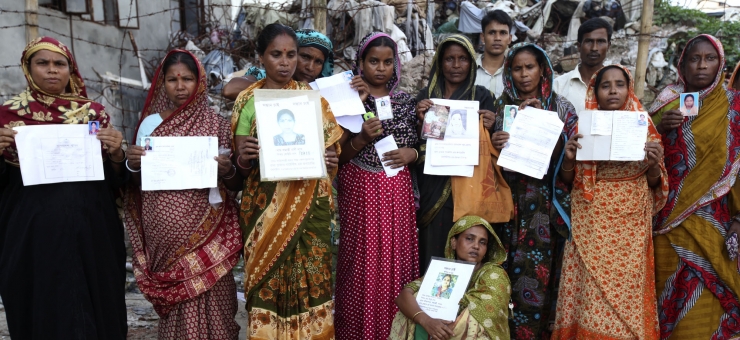European Action plan following the Bangladesh garment sector H&S Accord

The Bangladesh Accord on Fire & Building Safety, signed after the Rana Plaza disaster that cost the lives of over 1,100 workers in the garment industry in April 2013, broke new ground with regard to Corporate Social Responsibility (CSR). It is the very first time that trade unions and garment brands world-wide are jointly involved in the monitoring of a legally-binding instrument of this kind. More than 40 trade union representatives from the European garment and retail companies that signed the Accord are gathered in Brussels today to discuss how they can provide concrete support and further protection for their colleagues in Bangladesh.
The Accord is the result of a global campaign led by IndustriALL Global Union and UNI Global Union which was signed on 15 May 2013. It has six key components:
- A 5-year legally binding agreement between brands and trade unions to ensure a safe working environment in the Bangladeshi RMG industry
- An independent inspection programme supported by brands in which workers and trade unions are involved
- Public disclosure of all factories, inspection reports and corrective action plans (CAP)
- A commitment by signatory brands to ensure sufficient funds are available for remediation and to maintain sourcing relationships
- Democratically-elected health and safety committees in all factories to identify and act on health and safety risks
- Worker empowerment through an extensive training programme, a complaints mechanism and the right to refuse unsafe work.
The Brussels workshop on 12 and 13 February explores the pressure that European worker representatives in European Works Councils, local works councils and trade union structures can exert on their own European employer towards fulfilling their commitments towards workers at the factories of their suppliers and subcontractors in the global South, as laid down in the Accord. Monitoring, enquiring, using the institutional tools made available to workers in European multinationals – such as European Works Council (EWC) or Board Level Employee Representatives (BLER) – and traditional trade union action are all on the agenda of the workshop.
"Corporate Social Responsibility can no longer be simply a matter of voluntary promises by companies alone: this approach has been tried for 20 years, and failed", stated IndustriAll Europe Deputy General Secretary Luc Triangle. "We need to specifically focus on improvements brought to wages, working conditions and the labour rights of our colleagues in the global South. The only way forward is through legally-binding, enforceable agreements, with independent monitoring of their implementation– involving the trade unions. The Bangladesh Accord is a prototype in this respect." He welcomed this workshop as being an example of what the world-wide, trans-sector cooperation of workers in the garment and retail sectors, in Europe and in Bangladesh can achieve to concretely improve labour conditions world-wide.
The workshop is organised by the European Worker Participation Competence Centre and the European Trade Union Institute (ETUI), in cooperation between industriAll Europe, IndustriALL Global Union, UNI Global Union and UNI Europa.

